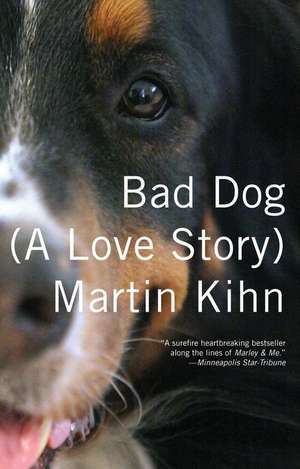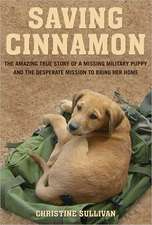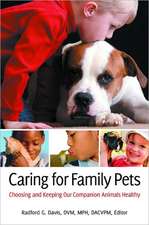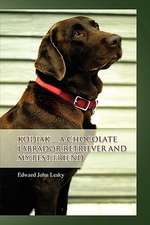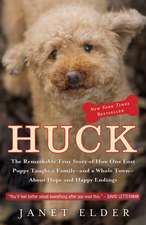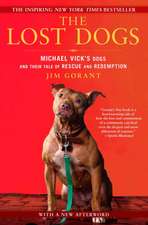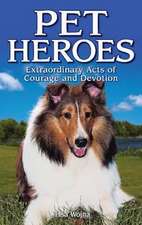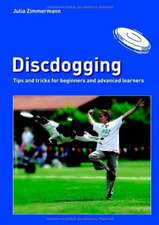Bad Dog: (A Love Story)
Autor Martin Kihnen Limba Engleză Paperback – 31 mar 2012
Hola may be the most beautiful Bernese mountain dog in the world, but she's never been trained, so it's not her fault if she tackles strangers, chews on furniture, and runs after buses. That honor falls to Marty, Hola's supposed master, who is a high-functioning alcoholic. A TV writer turned management consultant, Marty's in debt and out of shape; he's about to lose his job, and his wife, too, if he can't get his life--and his dog--under control. Desperately trying to save his marriage, Marty throws himself headlong into the world of competitive dog training. Unfortunately, he knows even less than Hola, the only dog ever to be expelled from her puppy preschool twice.
Preț: 96.11 lei
Nou
Puncte Express: 144
Preț estimativ în valută:
18.39€ • 19.25$ • 15.22£
18.39€ • 19.25$ • 15.22£
Carte disponibilă
Livrare economică 15-29 martie
Preluare comenzi: 021 569.72.76
Specificații
ISBN-13: 9780307477460
ISBN-10: 0307477460
Pagini: 224
Ilustrații: illustrations
Dimensiuni: 135 x 202 x 16 mm
Greutate: 0.22 kg
Editura: Vintage Publishing
ISBN-10: 0307477460
Pagini: 224
Ilustrații: illustrations
Dimensiuni: 135 x 202 x 16 mm
Greutate: 0.22 kg
Editura: Vintage Publishing
Notă biografică
Martin Kihn is an Emmy Award–nominated former writer for MTV’s Pop-Up Video and the author of House of Lies and A$$hole. He has worked at Spy, Forbes, and New York, and his articles have appeared in The New York Times, GQ, Details, and Cosmopolitan. He lives in Minneapolis.
Extras
Introduction
Entering the Ring
“Is it just me,” I ask my ninety-pound copilot, framed in the rearview mirror like a hairy Warhol Marilyn, “or is everyone losing their minds?”
I’m sorry to say, she seems to be sorry to say, it’s just you.
“Did we miss our turn? I can’t see the signs.”
And I, she says, can’t read.
Now I will advise that when you’re going somewhere that is not so easy to get to, don’t let me drive.
There are few guarantees in life like the one I will make to you now: you will get lost. Very lost. So far from your destination you’ll be looking out the window as darkness descends, watching street signs change into another language. During my days as the world’s most ungrateful management consultant, I tooled around London in a rented Ford Fiesta with one of the firm’s partners, who spun on me after a string of boneheaded turns and said, “Who was it that hired you again?”
Losing her religion, my copilot—a five-year-old Bernese mountain dog named Hola—stretches herself out on the backseat of our alarmingly small car and moans softly, serenely, like a butterfly being sawn in half by wind.
“You’re not helping,” I say to her, as the Sprain Brook Park way is glazed with a silver coat of fear.
Neither are you. Did you bring any cheese?
“If you’re driving,” says the guy on 1010 WINS news radio, “think about getting off the road. We have a severe weather warning. It’s going to get ugly out there.”
Not as ugly as White Plains, New York.
A gray blanket stuffed with old malls, it claims to be thirty minutes north of Manhattan. Ninety minutes after setting out, Hola and I finally slide into the parking lot of the Port Chester Obedience Training Club, where we’re scheduled to take the Canine Good Citizen test ten minutes ago.
The PCOTC is a legendary facility that relocated from Port Chester to an industrial district in White Plains without changing its name. It readies little woofers and their handlers for everything from crate training to all-breed shows, and five years earlier, Hola had the distinction of being the only dog in her puppy kindergarten class to be invited to leave. Twice.
Let it not be said that my dog is not a legend in the canine obedience world.
She’s a beautiful, tricolored purebred dog; a spectacularly fluffy, optimistic creature with true Broadway spirit and an explosive commitment to now.
I keep expecting her to stand up on her hind paws to make her Tony acceptance speech:
“I remember when I was a little puppy, lying on my doggie bed watching Beethoven’s 3rd on DVD and thinking, ‘I can do that!’ . . .”
And I mean no disrespect to her when I say that all things considered, taking the long view and giving her the full benefit of the doubt, she was a horrible bitch.
Storm clouds morph from a hazy gray to an oily, ominous rust as the volume of snow per square inch of air throttles up.
“Hola, come!” I say, holding open the car’s back door.
Because I have enough cut-up raw liver in my snow jacket pocket to open a meat market, she jumps out.
I saddle her into her little harness, lock the car, check that I have her dog license, rabies tag, hairbrush, and—the critical item—her complete attention. Then I tuck myself into classic dog handler’s heeling position, left arm bent with my hand on my sacral third chakra, body erect and as still as the truth.
Stepping off on my left foot, cuing Hola to heel, I start toward our destiny.
Miraculously, she follows.
Step, step. Head up. Sky down. My jeans feeling loose on my stress-addled torso, I can finally exhale.
We skate the iron ramp, negotiate past a boxer puppy in the outer swing doors, and I ask Hola to sit in front of the second set of doors so I can precede her.
Always lead, you see: follow a dog and you follow a doubt.
“Hola, sit.” Remember: name first, command second.
I say: “Grrr.”
Aversive sound, meaning: Seriously, sit.
Hola sits.
As I pull the door open, seeing the ring set up for the test, with the white PVC accordion gates, the official note takers and stewards, the distracter dog for the dreaded item #8 (reaction to another dog), a dozen or so of our training buddies nervously clamped to the walls watching the empty ring, the evaluator pacing the expanse of Mity-Lite polymer matting looking for stray treats left over from Family Manners class, the industrial warehouse roofing and the rusted crates and agility equipment strewn like an A-frame junkyard in the far ring, the beautiful goldens and Labs and Havanese stress-smiling in a united chorus of Hello, world!—well, we have only one thought, Hola and me.
We are home.
Release word: “Okay.”
She trails me into the club.
##
What we’re doing here is a canine mystery.
If you’d told me one year earlier that the two of us could trot into Port Chester as legitimate contenders for an American Kennel Club–sanctioned obedience certification—Canine Good Citizen—I’d have thought you had rolled your brain in catnip and set it on fire.
Begun in 1989, the CGC is a test of training and temperament; to pass, a dog has to be able to sit quietly for petting and around other dogs, tolerate handling and distractions, walk on a loose lead through a crowd, prove it knows basic commands such as sit, down, stay, and come, and endure a few minutes’ separation from its owner without obvious distress.
Some dogs can pass it after a couple of classes and a pep talk.
Then there is Hola.
Everybody knew what was wrong with my dog.
I could take her anywhere, and she particularly enjoyed the works of Pixar. Obeying my whispered commands was like breathing to her, and at times I entertained the idea she could actually read my mind. Her sits were so straight you could level a cabinet with them, her down-stays so still they bordered on a trance. Sometimes I’d put her into a stay, go and have a medical procedure, visit my mother in West Virginia, and she’d still be there when I got back from the airport, patiently awaiting my release: “Okay! Good girl.”
Not.
Truth was, just one year ago, Hola had never met a word she could recognize, including her name. Friends and strangers alike were greeted with a full-body slam that was just this side of actionable. The only invitation needed was a smile, a pulse, or a Baby Bjorn. My apartment was a wasteland of gnawed dados and wee wee–stained chintz. Walks were a haphazard dance of death as she lunged at any passing Subway wrapper, unleashed Pomeranian, or Crip.
“She doesn’t mean to be bad,” said one of the trainers my wife and I consulted during Hola’s first few years on earth. “She’s just kind of high-strung.”
There are other words for what she was.
“Why is she always running around and jumping on people and not listening?” I asked the guy, who handled K-9 police dogs.
“That’s easy,” he said. “You don’t know anything about dogs.”
Ah.
We’d had so much hope, my wife, Gloria, and I. It still stings me to remember with what prematernal optimism we read Jean Donaldson and Karen Pryor and Sharon Chesnutt Smith’s The New Bernese Mountain Dog, scouring hardware stores for these strange things called baby gates. She mail-ordered a Bernese-ready version of what dog people call a crate—it’s a cage—and I almost had a petit mal. It was bigger than our Toyota Echo.
Dreams die hard, and so did this one. Puppies are a pain at any price, and we marked up a lot to exuberance. Certainly she wasn’t shy. Just ask our neighbors. Many times she helped them with their groceries and tossed in a prostate exam on the house. Years passed and passed again.
At a certain point, without announcing it even to ourselves, we gave up. I gave up. We’d had our idea of what a pet should be and had been baited and switched. We’d been had by the dogs of the gods or vice versa. She was housebroken; she seemed happy; she didn’t actually bite people, with a single exception.
What I know now is that settling for a dog who is housebroken and doesn’t draw blood is like settling for a child who can talk.
And I might as well admit the exception was my wife.
Gradually—very gradually—as we stopped working with Hola, she turned into a beast. There are reasonable people who would have euthanized her for the way she treated Gloria, and to those people I have no response.
“She’s a wild one, dude,” said another of the trainers we visited to deal with this new reign of terror—the occasional growling, the passing nips, the light bruising and marks on my wife’s arms and legs that more than once had a predictable result.
“How’d that happen?” asked some woman at Ann Taylor or at the Whole Foods where Gloria worked for a year as a cook.
“My dog did it.”
A look of deep, sisterly karma. “It’s okay,” they’d whisper. “You don’t have to lie for him anymore. There are people who can help you.”
“Really, it’s my dog. She’s a menace.”
“Of course it is, girlfriend. Of course it is.”
Wink.
Of course it’s the man. And were they so wrong? Where was the man, after all?
So I am being sincere when I say I don’t lay blame for what Gloria decided to do next. She saved both of our lives—mine and the dog’s—after all.
##
She left us.
Gloria is a wiry, birdlike woman with bobbed brown hair, a sharp nose, and milk-bottle glasses; she’s usually smiling slightly as though eavesdropping on a funny conversation. Her eyes are a serious blue that almost glows, and her skin is pale and buttery, her features stacked together with such unusual symmetry that the first thing my male friends usually said to me after meeting her was: “Wow.”
A professional charmer, she’s reduced vanloads of folk-song fans in Manhattan’s East Village to tears with her gorgeous voice, tart lyrics, and improvised monologues. The one about the death of Frank Sinatra was a classic I wish I’d committed to tape. She has a master’s in music theory and can recognize any celebrity, no matter how obscure, by their voice.
People love her, and those who do not simply haven’t met her yet. She is utterly uncontroversial. Coincidentally, she’s suffered a few dog years herself. She’d decided to go to cooking school, worked for a while, and then quit because the career was too dangerous and poorly paid.
Inspired by the old Schoolhouse Rock series, she started writing one-minute songs about cooking techniques—“Read the Recipe All the Way Through”; “Shock-Shock-Shock the Vegetables,” in the style of the Ramones; the ribald “Pull Wiggle Wiggle,” a pseudo-gospel song about how to bone a fish—and set them to animated videos featuring a trio of musical chefs named Do, Re, and Mi.
Chefdoremi.com is her message to the world, which so far is considering its response.
I still believe she is some kind of genius, but she has reservations.
And, like many Gen Xers, we’d sort of forgotten to have children until it was probably too late.
##
As snow continues to swallow the obedience club, I hand back the CGC forms in triplicate. AKC registration number—yes. Spayed—yes. Age—almost six now, an old lady in Bernese mountain dog time.
“You’ll be second,” says the steward. “Wait over at the side, please.”
Let’s go into the corner, Hola seems to say, and remind me what I’m supposed to do here. Preferably using a food lure.
As I’m walking backward monitoring Hola’s stay, I scan the ring where the first team is doing item #7, “Coming when called.”
The dog half of the pair is a rather sluggish toy poodle who meanders back to her handler like she’s waist-deep in canola oil.
“Did you see that, Hola?” I whisper. “No pizzazz at all.”
That poodle lacks heart, she agrees. She has no business out there on the mat.
##
For the first ten years of my marriage, after a month locked in a rehab I don’t remember checking into, I’d been abstinent from alcohol.
Stop me if you’ve heard this story before.
Burned out as a TV writer, I went back to business school and got a job as a management consultant, working out of hotel rooms in cities far, far away, and one night I went into the mini-bar for a Diet Pepsi and thought, Well, nothing livens up a Diet Pepsi like some Captain Morgan, correct?
So I took out the bottle and unscrewed the cap.
I see now the difference between sobriety and abstinence is like the difference between marriage and pornography. It’s apples and rotary saws.
To her credit, Gloria stayed with me through my bottom, stayed with Hola and me as we began our own Incredible Journey of mutual rehabilitation, then went off on a journey of her own.
To this day, I understand.
In the words of a country song she wrote, “You’re Leavin’ Me, You Lucky Dog (If I Was You I’d Leave Me Too).”
Hola and I trotted on alone: to a terrifying dog camp in the Green Mountains of Virginia, a gallery of trainers and priests, all-breed shows, and obedience demonstrations, meeting wonderful people along the way—the top Bernese mountain dog breeder, the national canine obedience champion, the world’s best dog writer, even the head of the CGC program herself.
It doesn’t take an advanced degree in animal behavior to see that I traded an obsession with alcohol for an obsession with dog training.
But looking back, I like to give our adventure a more romantic spin: we were trying to get Gloria back. Somehow I thought succeeding in the impossible task of winning our four-legged demon child a Canine Good Citizen rating would make us both family friendly again.
To be fair, Gloria didn’t know this; even I didn’t know this in the beginning.
But I’m sure that Hola did.
##
We’re practicing our automatic sits as the steward comes up to us from the judge’s table.
She’s a large, older woman in an L.L. Bean red flannel shirt, and her breath spreads out in front of her like a paint roller. Her wide face is a map of White Plains: gray, flat, and functional.
“Are you Hola?” she asks me.
“Yes.”
“Here for the CGC, right? Not Therapy Dog?”
“Yes.”
“You’re up next. Use the buckle collar. Leave the treats outside the ring. Are you ready?”
I peer down at my sidekick, whose head is cocked to the left quizzically in a look that says life is a punch line, so you’d better be joking.
“Are we ready, girlfriend?”
Are you kidding me? she says, breaking her sit on my cue. I was BORN ready!
So we enter the ring . . .
From the Hardcover edition.
Entering the Ring
“Is it just me,” I ask my ninety-pound copilot, framed in the rearview mirror like a hairy Warhol Marilyn, “or is everyone losing their minds?”
I’m sorry to say, she seems to be sorry to say, it’s just you.
“Did we miss our turn? I can’t see the signs.”
And I, she says, can’t read.
Now I will advise that when you’re going somewhere that is not so easy to get to, don’t let me drive.
There are few guarantees in life like the one I will make to you now: you will get lost. Very lost. So far from your destination you’ll be looking out the window as darkness descends, watching street signs change into another language. During my days as the world’s most ungrateful management consultant, I tooled around London in a rented Ford Fiesta with one of the firm’s partners, who spun on me after a string of boneheaded turns and said, “Who was it that hired you again?”
Losing her religion, my copilot—a five-year-old Bernese mountain dog named Hola—stretches herself out on the backseat of our alarmingly small car and moans softly, serenely, like a butterfly being sawn in half by wind.
“You’re not helping,” I say to her, as the Sprain Brook Park way is glazed with a silver coat of fear.
Neither are you. Did you bring any cheese?
“If you’re driving,” says the guy on 1010 WINS news radio, “think about getting off the road. We have a severe weather warning. It’s going to get ugly out there.”
Not as ugly as White Plains, New York.
A gray blanket stuffed with old malls, it claims to be thirty minutes north of Manhattan. Ninety minutes after setting out, Hola and I finally slide into the parking lot of the Port Chester Obedience Training Club, where we’re scheduled to take the Canine Good Citizen test ten minutes ago.
The PCOTC is a legendary facility that relocated from Port Chester to an industrial district in White Plains without changing its name. It readies little woofers and their handlers for everything from crate training to all-breed shows, and five years earlier, Hola had the distinction of being the only dog in her puppy kindergarten class to be invited to leave. Twice.
Let it not be said that my dog is not a legend in the canine obedience world.
She’s a beautiful, tricolored purebred dog; a spectacularly fluffy, optimistic creature with true Broadway spirit and an explosive commitment to now.
I keep expecting her to stand up on her hind paws to make her Tony acceptance speech:
“I remember when I was a little puppy, lying on my doggie bed watching Beethoven’s 3rd on DVD and thinking, ‘I can do that!’ . . .”
And I mean no disrespect to her when I say that all things considered, taking the long view and giving her the full benefit of the doubt, she was a horrible bitch.
Storm clouds morph from a hazy gray to an oily, ominous rust as the volume of snow per square inch of air throttles up.
“Hola, come!” I say, holding open the car’s back door.
Because I have enough cut-up raw liver in my snow jacket pocket to open a meat market, she jumps out.
I saddle her into her little harness, lock the car, check that I have her dog license, rabies tag, hairbrush, and—the critical item—her complete attention. Then I tuck myself into classic dog handler’s heeling position, left arm bent with my hand on my sacral third chakra, body erect and as still as the truth.
Stepping off on my left foot, cuing Hola to heel, I start toward our destiny.
Miraculously, she follows.
Step, step. Head up. Sky down. My jeans feeling loose on my stress-addled torso, I can finally exhale.
We skate the iron ramp, negotiate past a boxer puppy in the outer swing doors, and I ask Hola to sit in front of the second set of doors so I can precede her.
Always lead, you see: follow a dog and you follow a doubt.
“Hola, sit.” Remember: name first, command second.
I say: “Grrr.”
Aversive sound, meaning: Seriously, sit.
Hola sits.
As I pull the door open, seeing the ring set up for the test, with the white PVC accordion gates, the official note takers and stewards, the distracter dog for the dreaded item #8 (reaction to another dog), a dozen or so of our training buddies nervously clamped to the walls watching the empty ring, the evaluator pacing the expanse of Mity-Lite polymer matting looking for stray treats left over from Family Manners class, the industrial warehouse roofing and the rusted crates and agility equipment strewn like an A-frame junkyard in the far ring, the beautiful goldens and Labs and Havanese stress-smiling in a united chorus of Hello, world!—well, we have only one thought, Hola and me.
We are home.
Release word: “Okay.”
She trails me into the club.
##
What we’re doing here is a canine mystery.
If you’d told me one year earlier that the two of us could trot into Port Chester as legitimate contenders for an American Kennel Club–sanctioned obedience certification—Canine Good Citizen—I’d have thought you had rolled your brain in catnip and set it on fire.
Begun in 1989, the CGC is a test of training and temperament; to pass, a dog has to be able to sit quietly for petting and around other dogs, tolerate handling and distractions, walk on a loose lead through a crowd, prove it knows basic commands such as sit, down, stay, and come, and endure a few minutes’ separation from its owner without obvious distress.
Some dogs can pass it after a couple of classes and a pep talk.
Then there is Hola.
Everybody knew what was wrong with my dog.
I could take her anywhere, and she particularly enjoyed the works of Pixar. Obeying my whispered commands was like breathing to her, and at times I entertained the idea she could actually read my mind. Her sits were so straight you could level a cabinet with them, her down-stays so still they bordered on a trance. Sometimes I’d put her into a stay, go and have a medical procedure, visit my mother in West Virginia, and she’d still be there when I got back from the airport, patiently awaiting my release: “Okay! Good girl.”
Not.
Truth was, just one year ago, Hola had never met a word she could recognize, including her name. Friends and strangers alike were greeted with a full-body slam that was just this side of actionable. The only invitation needed was a smile, a pulse, or a Baby Bjorn. My apartment was a wasteland of gnawed dados and wee wee–stained chintz. Walks were a haphazard dance of death as she lunged at any passing Subway wrapper, unleashed Pomeranian, or Crip.
“She doesn’t mean to be bad,” said one of the trainers my wife and I consulted during Hola’s first few years on earth. “She’s just kind of high-strung.”
There are other words for what she was.
“Why is she always running around and jumping on people and not listening?” I asked the guy, who handled K-9 police dogs.
“That’s easy,” he said. “You don’t know anything about dogs.”
Ah.
We’d had so much hope, my wife, Gloria, and I. It still stings me to remember with what prematernal optimism we read Jean Donaldson and Karen Pryor and Sharon Chesnutt Smith’s The New Bernese Mountain Dog, scouring hardware stores for these strange things called baby gates. She mail-ordered a Bernese-ready version of what dog people call a crate—it’s a cage—and I almost had a petit mal. It was bigger than our Toyota Echo.
Dreams die hard, and so did this one. Puppies are a pain at any price, and we marked up a lot to exuberance. Certainly she wasn’t shy. Just ask our neighbors. Many times she helped them with their groceries and tossed in a prostate exam on the house. Years passed and passed again.
At a certain point, without announcing it even to ourselves, we gave up. I gave up. We’d had our idea of what a pet should be and had been baited and switched. We’d been had by the dogs of the gods or vice versa. She was housebroken; she seemed happy; she didn’t actually bite people, with a single exception.
What I know now is that settling for a dog who is housebroken and doesn’t draw blood is like settling for a child who can talk.
And I might as well admit the exception was my wife.
Gradually—very gradually—as we stopped working with Hola, she turned into a beast. There are reasonable people who would have euthanized her for the way she treated Gloria, and to those people I have no response.
“She’s a wild one, dude,” said another of the trainers we visited to deal with this new reign of terror—the occasional growling, the passing nips, the light bruising and marks on my wife’s arms and legs that more than once had a predictable result.
“How’d that happen?” asked some woman at Ann Taylor or at the Whole Foods where Gloria worked for a year as a cook.
“My dog did it.”
A look of deep, sisterly karma. “It’s okay,” they’d whisper. “You don’t have to lie for him anymore. There are people who can help you.”
“Really, it’s my dog. She’s a menace.”
“Of course it is, girlfriend. Of course it is.”
Wink.
Of course it’s the man. And were they so wrong? Where was the man, after all?
So I am being sincere when I say I don’t lay blame for what Gloria decided to do next. She saved both of our lives—mine and the dog’s—after all.
##
She left us.
Gloria is a wiry, birdlike woman with bobbed brown hair, a sharp nose, and milk-bottle glasses; she’s usually smiling slightly as though eavesdropping on a funny conversation. Her eyes are a serious blue that almost glows, and her skin is pale and buttery, her features stacked together with such unusual symmetry that the first thing my male friends usually said to me after meeting her was: “Wow.”
A professional charmer, she’s reduced vanloads of folk-song fans in Manhattan’s East Village to tears with her gorgeous voice, tart lyrics, and improvised monologues. The one about the death of Frank Sinatra was a classic I wish I’d committed to tape. She has a master’s in music theory and can recognize any celebrity, no matter how obscure, by their voice.
People love her, and those who do not simply haven’t met her yet. She is utterly uncontroversial. Coincidentally, she’s suffered a few dog years herself. She’d decided to go to cooking school, worked for a while, and then quit because the career was too dangerous and poorly paid.
Inspired by the old Schoolhouse Rock series, she started writing one-minute songs about cooking techniques—“Read the Recipe All the Way Through”; “Shock-Shock-Shock the Vegetables,” in the style of the Ramones; the ribald “Pull Wiggle Wiggle,” a pseudo-gospel song about how to bone a fish—and set them to animated videos featuring a trio of musical chefs named Do, Re, and Mi.
Chefdoremi.com is her message to the world, which so far is considering its response.
I still believe she is some kind of genius, but she has reservations.
And, like many Gen Xers, we’d sort of forgotten to have children until it was probably too late.
##
As snow continues to swallow the obedience club, I hand back the CGC forms in triplicate. AKC registration number—yes. Spayed—yes. Age—almost six now, an old lady in Bernese mountain dog time.
“You’ll be second,” says the steward. “Wait over at the side, please.”
Let’s go into the corner, Hola seems to say, and remind me what I’m supposed to do here. Preferably using a food lure.
As I’m walking backward monitoring Hola’s stay, I scan the ring where the first team is doing item #7, “Coming when called.”
The dog half of the pair is a rather sluggish toy poodle who meanders back to her handler like she’s waist-deep in canola oil.
“Did you see that, Hola?” I whisper. “No pizzazz at all.”
That poodle lacks heart, she agrees. She has no business out there on the mat.
##
For the first ten years of my marriage, after a month locked in a rehab I don’t remember checking into, I’d been abstinent from alcohol.
Stop me if you’ve heard this story before.
Burned out as a TV writer, I went back to business school and got a job as a management consultant, working out of hotel rooms in cities far, far away, and one night I went into the mini-bar for a Diet Pepsi and thought, Well, nothing livens up a Diet Pepsi like some Captain Morgan, correct?
So I took out the bottle and unscrewed the cap.
I see now the difference between sobriety and abstinence is like the difference between marriage and pornography. It’s apples and rotary saws.
To her credit, Gloria stayed with me through my bottom, stayed with Hola and me as we began our own Incredible Journey of mutual rehabilitation, then went off on a journey of her own.
To this day, I understand.
In the words of a country song she wrote, “You’re Leavin’ Me, You Lucky Dog (If I Was You I’d Leave Me Too).”
Hola and I trotted on alone: to a terrifying dog camp in the Green Mountains of Virginia, a gallery of trainers and priests, all-breed shows, and obedience demonstrations, meeting wonderful people along the way—the top Bernese mountain dog breeder, the national canine obedience champion, the world’s best dog writer, even the head of the CGC program herself.
It doesn’t take an advanced degree in animal behavior to see that I traded an obsession with alcohol for an obsession with dog training.
But looking back, I like to give our adventure a more romantic spin: we were trying to get Gloria back. Somehow I thought succeeding in the impossible task of winning our four-legged demon child a Canine Good Citizen rating would make us both family friendly again.
To be fair, Gloria didn’t know this; even I didn’t know this in the beginning.
But I’m sure that Hola did.
##
We’re practicing our automatic sits as the steward comes up to us from the judge’s table.
She’s a large, older woman in an L.L. Bean red flannel shirt, and her breath spreads out in front of her like a paint roller. Her wide face is a map of White Plains: gray, flat, and functional.
“Are you Hola?” she asks me.
“Yes.”
“Here for the CGC, right? Not Therapy Dog?”
“Yes.”
“You’re up next. Use the buckle collar. Leave the treats outside the ring. Are you ready?”
I peer down at my sidekick, whose head is cocked to the left quizzically in a look that says life is a punch line, so you’d better be joking.
“Are we ready, girlfriend?”
Are you kidding me? she says, breaking her sit on my cue. I was BORN ready!
So we enter the ring . . .
From the Hardcover edition.
Recenzii
"Martin Kihn is just too talented—I still don’t know how a writer can be that laugh-out-loud funny while chronicling a major life crisis—and his story is just too good to miss. (And of course the soulful pictures of Hola, his lovely Bernese mountain dog, don’t hurt either.)"
—Marjorie Kehe, Christian Science Monitor
"It’s the special relationship between man and animal that form the heart of the memoir. . . Any dog lover is bound to tear up over the love and trust that can exist between a person and their dog, which Kihn captures perfectly with a blend of earnest emotional catharsis and wry humor."
—Katie Stroh, The Daily Texan
"Not a cozy Marley and Me duplicate or Cesar Millan–type training book (though readers will learn a lot about the value of appropriate training from someone who’s been there), this sharply written, darkly funny memoir–cum–dog story–cum–recovery tale is a quick, absorbing read that will serve a wide audience well."
—Barbara Hoffert, Library Journal (Starred Review)
"This wry memoir of the human-dog bond is one that eschews the usual treacly sentimentality in favor of a raw, deeply sincere, and self-aware homage to this powerful bond."
—Publishers Weekly (Starred review)
"Hola, surprise, surprise, grows enormous, while also growing out of control, ignoring commands, sprawling, immovable, across the bed. Add to this rowdy mix the fact that Kihn drinks way too much and that his wife, Gloria, is on the verge of leaving him, and you have a recipe for a surefire heartbreaking bestseller along the lines of Marley and Me."
—Laurie Hertzel, Minneapolis Star-Tribune
“This tale of a man who forgot he was a man and the dog who ultimately reminded him is the most touching, original buddy story I’ve come across in ages. Sit. Stay. Read.”
—Walter Kirn, author of Up in the Air
“A modern masterpiece that captures the dark side of K9 love.”
—Julia Szabo, Dogster.com
“Martin Kihn’s agile wit is showcased in this memoir of addiction, recovery, and the highs and lows of canine and human behavior. Despite its compact form, Bad Dog carries a surprising amount of weight, and when you're not looking, it will knock you over and charm you, all while licking your face.”
—Charles Yu, author of How to Live Safely in a Science Fictional Universe
“A bittersweet tale of renewal . . . An endearing read full of hope, humor and humility.”
—Kirkus Reviews
—Marjorie Kehe, Christian Science Monitor
"It’s the special relationship between man and animal that form the heart of the memoir. . . Any dog lover is bound to tear up over the love and trust that can exist between a person and their dog, which Kihn captures perfectly with a blend of earnest emotional catharsis and wry humor."
—Katie Stroh, The Daily Texan
"Not a cozy Marley and Me duplicate or Cesar Millan–type training book (though readers will learn a lot about the value of appropriate training from someone who’s been there), this sharply written, darkly funny memoir–cum–dog story–cum–recovery tale is a quick, absorbing read that will serve a wide audience well."
—Barbara Hoffert, Library Journal (Starred Review)
"This wry memoir of the human-dog bond is one that eschews the usual treacly sentimentality in favor of a raw, deeply sincere, and self-aware homage to this powerful bond."
—Publishers Weekly (Starred review)
"Hola, surprise, surprise, grows enormous, while also growing out of control, ignoring commands, sprawling, immovable, across the bed. Add to this rowdy mix the fact that Kihn drinks way too much and that his wife, Gloria, is on the verge of leaving him, and you have a recipe for a surefire heartbreaking bestseller along the lines of Marley and Me."
—Laurie Hertzel, Minneapolis Star-Tribune
“This tale of a man who forgot he was a man and the dog who ultimately reminded him is the most touching, original buddy story I’ve come across in ages. Sit. Stay. Read.”
—Walter Kirn, author of Up in the Air
“A modern masterpiece that captures the dark side of K9 love.”
—Julia Szabo, Dogster.com
“Martin Kihn’s agile wit is showcased in this memoir of addiction, recovery, and the highs and lows of canine and human behavior. Despite its compact form, Bad Dog carries a surprising amount of weight, and when you're not looking, it will knock you over and charm you, all while licking your face.”
—Charles Yu, author of How to Live Safely in a Science Fictional Universe
“A bittersweet tale of renewal . . . An endearing read full of hope, humor and humility.”
—Kirkus Reviews
